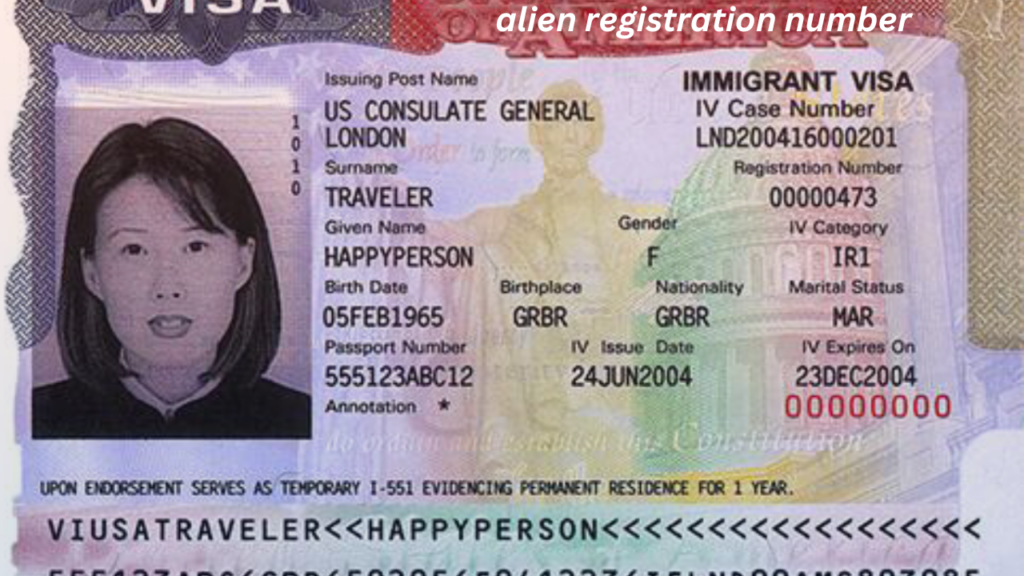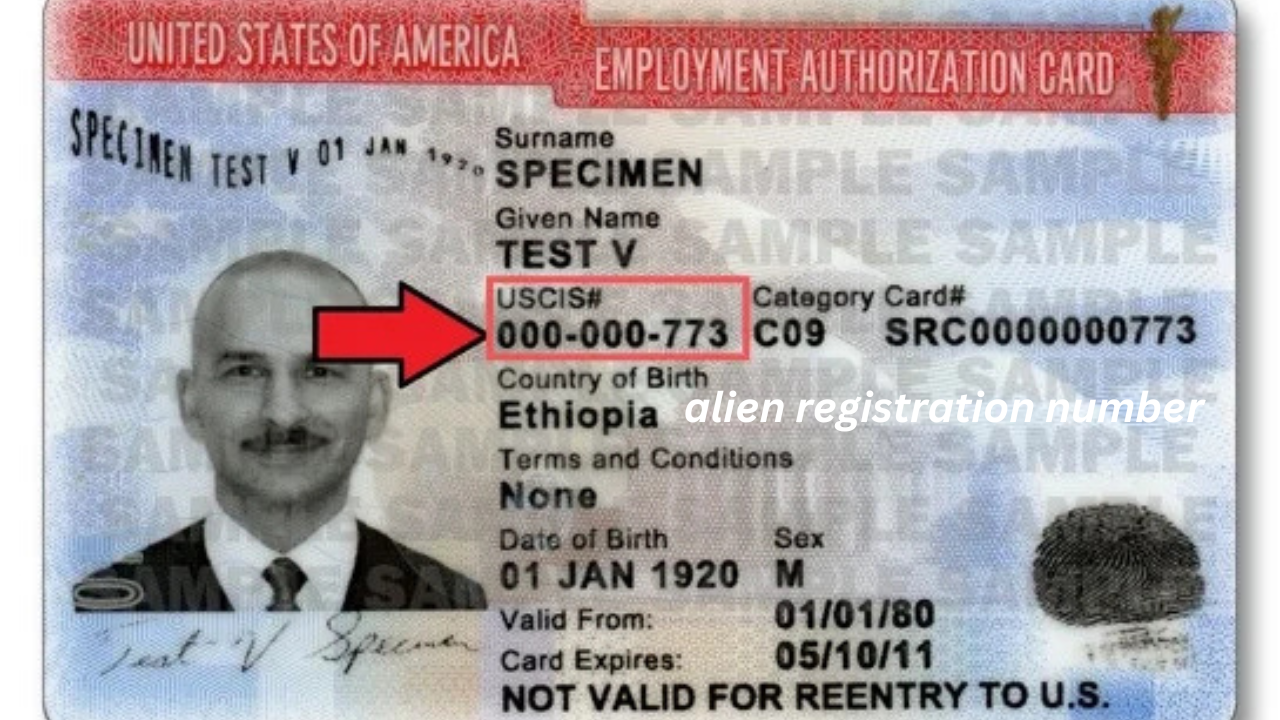The United States immigration system is complex, with various forms, documentation, and requirements that foreign nationals must fulfill to enter, stay, and work in the country. One of the essential identifiers in this process is the Alien Registration Number, also called the A-Number. This unique identifier is used by U.S. Citizenship and Immigration Services (USCIS) to track the records and status of foreign nationals who interact with U.S. immigration authorities. In this article, we’ll delve deep into the Alien Registration Number, how to obtain it, why it’s important, and answer some common questions about this crucial part of the immigration process.
What is an Alien Registration Number?
The Alien Registration Number (A-Number) is a unique identifier assigned by USCIS to individuals who are not U.S. citizens but have a legal presence in the United States. It is a 7 to 9-digit number that helps track the immigration records of foreign nationals. Whether you’re applying for a visa, a green card (lawful permanent resident status), or working in the U.S., your A-Number will be part of your immigration paperwork.
Foreign nationals granted asylum, refugee status, or other forms of legal immigration status are also assigned an A-Number. The number stays with the individual throughout their time in the U.S. and may remain relevant for tracking purposes long after their immigration status changes or expires.
History and Purpose of the Alien Registration Number

The U.S. government began assigning Alien Registration Numbers in the 1940s in an effort to better track non-citizens entering and staying in the country. Before this system, foreign nationals didn’t have a standardized identifier, which made it difficult for U.S. immigration authorities to monitor their legal status and history.
Today, the Alien Registration Number is vital in administrating immigration processes. Its purpose is twofold:
- Identification: It serves as a unique identifier for each non-citizen, ensuring that the government accurately tracks and manages all of their records.
- Record Keeping: The A-Number ensures the smooth processing of applications, petitions, and requests within the USCIS and other U.S. agencies.
Who Gets an Alien Registration Number?
Anyone interacting with U.S. immigration authorities can receive an Alien Registration Number. Below are the most common groups of people who get assigned an A-number:
- Lawful Permanent Residents (Green Card Holders): Individuals who have obtained lawful permanent resident status in the U.S. are given an A-Number. This number will track their green card status and related applications.
- Applicants for Permanent Residency: During the application process, people applying for a green card or adjustment of status from another visa category (such as H-1B or F-1) are assigned an Alien Registration Number.
- Asylum Seekers and Refugees: Foreign nationals granted asylum or refugee status in the U.S. are issued an A-Number to track their legal immigration status.
- Non-Immigrant Visa Holders: Individuals who have obtained certain non-immigrant visas such as student visas (F-1), work visas (H-1B), or visitor visas (B-1/B-2) might be assigned an A-Number, mainly if they apply for a change in status or extension.
- Individuals Under Deportation or Removal Proceedings: Foreign nationals involved in immigration court proceedings or facing deportation/removal are assigned an A-Number. This helps track their case throughout the legal process.
Where to Find Your Alien Registration Number
If you are a foreign national with an assigned A-Number, you will find it on several key immigration documents. These documents include:
- Green Card: If you are a lawful permanent resident, your Alien Registration Number will appear on your green card.
- Employment Authorization Document (EAD): If you are authorized to work in the U.S., your EAD card will have your A-Number.
- Immigrant Visa or Passport: When you are issued an immigrant visa, your A-Number may appear on your visa stamp or documentation related to your immigrant status.
- Form I-94: This document, also called the Arrival/Departure Record, which is issued when you enter the U.S., may contain your A-Number, especially for individuals applying for a change of status or extension.
- Form I-797 (Notice of Action): This form, which USCIS issues as an approval notice for petitions or applications, will include your A-Number if relevant to the case.
Why Is the Alien Registration Number Important?
The Alien Registration Number is an essential part of the U.S. immigration process for several reasons:
- Tracking and Record Keeping: The A-number is crucial for maintaining an accurate record of an individual’s immigration history. USCIS and other U.S. agencies can quickly reference this number to find an individual’s records and case history.
- Simplifying the Application Process: The A-Number simplifies processing petitions, applications, and other immigration-related documents. It reduces confusion by ensuring all forms are tied to a unique identifier.
- Avoiding Errors and Misidentification: The A-number minimizes the risk of errors or misidentification of applicants, especially for those with familiar names or multiple individuals with similar information.
- Access to Immigration Benefits: The A-number is often required when applying for immigration benefits such as work permits, travel authorization, or citizenship applications. Without this number, your immigration process could be delayed or denied.
- Deportation and Removal Proceedings: Individuals facing deportation or removal hearings will be tracked by their A-Number, which helps ensure their case is processed accurately in the immigration courts.
How to Obtain an Alien Registration Number
You don’t need to apply separately for an A-Number. It is automatically assigned to you when you apply for certain immigration benefits, such as a green card or status change. After your application is processed, USCIS will assign you an A-Number, which will be included in the approval notice or your visa documentation if you are granted the status you applied for.
What to Do if You Lose Your Alien Registration Number
If you lose your Alien Registration Number or forget it, there are steps you can take to retrieve it:
- Check Your Immigration Documents: As mentioned earlier, your A-Number will appear on key immigration documents like your green card, EAD, and Form I-94.
- Contact USCIS: If you can’t find your A-Number, contact USCIS for assistance. You may need to provide identifying information to retrieve it.
- Check Your USCIS Account: If you’ve set up a USCIS online account, you can view your A-Number by logging into your account and checking your case history.
Alien Registration Number and U.S. Citizenship
While an Alien Registration Number is crucial for non-citizens, U.S. citizens do not have one. However, in some cases, individuals may hold an A-Number during their immigration journey and later become U.S. citizens. Once a person naturalizes, the A-Number remains on their immigration record but no longer has any direct impact on their citizenship status.
Common Misunderstandings about the Alien Registration Number
There are a few myths and misunderstandings about the Alien Registration Number that should be cleared up:
- It’s Not a Social Security Number: Your A-Number differs from your Social Security Number (SSN). The SSN is used for tax and employment purposes, while the A-Number is for immigration purposes.
- It’s Not Always Visible: Some immigration documents may not display your A-Number, primarily if you haven’t yet been assigned one. For example, students on certain non-immigrant visas may not receive one immediately.
- It’s Not Tied to Your Immigration Status: The A-Number does not indicate your current immigration status. You must still maintain your visa or status to remain legally in the U.S.
FAQs
What is an Alien Registration Number
(A-Number)? An A-number is a unique identifier assigned to individuals who are not U.S. citizens but have legal status in the United States. It’s used to track immigration records and proceedings.
How do I get my Alien Registration Number?
You don’t apply for an A-Number separately. It’s automatically assigned when you apply for immigration benefits, such as a green card, visa, or status change.
Where can I find my Alien Registration Number?
Your A-Number can be found on key immigration documents such as your green card, employment authorization card (EAD), Form I-94, or approval notices (Form I-797).
Can I lose my Alien Registration Number?
No, you cannot lose your A-number. However, if you forget or misplace your documents, you can retrieve them by contacting USCIS or checking your immigration records.
Do U.S. citizens have an Alien Registration Number?
No, U.S. citizens do not have an A-number. This number is only used for non-citizens involved in the immigration process.
You May Also Read: https://ventsworlds.com/zillow-rentals/

